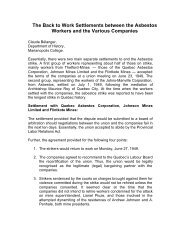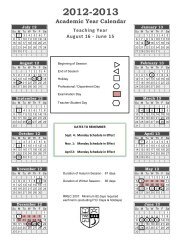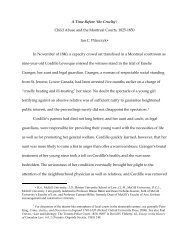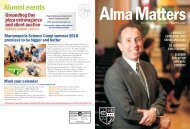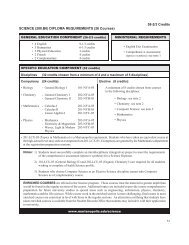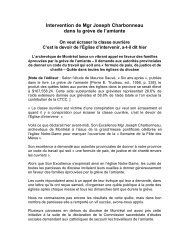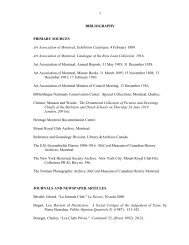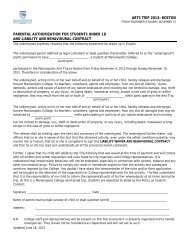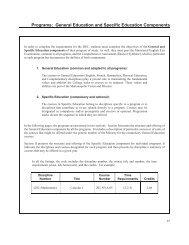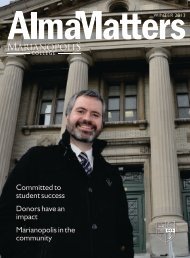FLQ Manifesto 1970 - Marianopolis
FLQ Manifesto 1970 - Marianopolis
FLQ Manifesto 1970 - Marianopolis
You also want an ePaper? Increase the reach of your titles
YUMPU automatically turns print PDFs into web optimized ePapers that Google loves.
<strong>FLQ</strong><br />
<strong>Manifesto</strong><br />
<strong>1970</strong><br />
edited by Damien-Claude Bélanger<br />
_____________________<br />
Editor’s Note<br />
The Front de libération du Québec (<strong>FLQ</strong>)’s use of the media was far more<br />
extensive and effective during the October Crisis than at any other point<br />
in the movement’s history. The Libération Cell of the <strong>FLQ</strong> released the<br />
following manifesto shortly after kidnapping James Cross, the British trade<br />
commissioner, on 5 October, <strong>1970</strong> in Montreal.<br />
The broadcast of the <strong>FLQ</strong> <strong>Manifesto</strong> was listed among the seven demands<br />
for Cross’s release. Although the Trudeau government initially attempted<br />
to suppress its circulation, it reluctantly allowed the French CBC to<br />
broadcast the manifesto on 8 October. The manifesto had been<br />
broadcast by CKAC, a Montreal radio station, the previous day. Designed<br />
to appeal to the masses, it eschewed the heavy theoretical leanings of<br />
previous <strong>FLQ</strong> manifestos and contained elements of joual (colloquial<br />
Canadian French). Its populism and irreverence struck a chord among<br />
many Quebecers.
Front de libération du Québec<br />
MANIFESTO<br />
The Front de libération du Québec is neither the Messiah nor a<br />
modern-day Robin Hood. It is a group of Quebec workers who are<br />
determined to use every means possible to ensure that the people of<br />
Quebec take control of their own destiny.<br />
The Front de libération du Québec wants total independence for<br />
Quebecers, united in a free society and purged for good of the<br />
clique of voracious sharks, the patronizing “big bosses” 1 and their<br />
henchmen who have made Quebec their private hunting ground for<br />
“cheap labor” 2 and unscrupulous exploitation.<br />
The Front de libération du Québec is not an aggressive movement,<br />
but rather a response to the aggression perpetrated by high finance<br />
through the puppet governments in Ottawa and Québec (the Brinks<br />
“show,” 3 Bill 63, 4 the electoral map, 5 the so-called “social progress”<br />
1<br />
In English in the original text (“big boss”). The <strong>FLQ</strong> used English terminology as a form of<br />
derision and also as a means to highlight the dominant role of Anglophones in Quebec’s<br />
economy.<br />
2<br />
In English in the original text.<br />
3<br />
In English in the original text. Shortly before the <strong>1970</strong> provincial election, the Royal Trust<br />
transferred thousands of certificates from Montreal to Toronto in a convoy of Brinks armoured<br />
trucks. The Royal Trust claimed that concerned clients had insisted that their investments and<br />
property be protected from a possible Parti québécois victory. The well‐publicized event was<br />
intended to dissuade Quebec voters from supporting the fledgling separatist party.<br />
4<br />
Enacted in 1969, Bill 63 was Quebec’s first major language law. It guaranteed parents the right to<br />
choose the language of instruction for their children, but required that children who received<br />
their education in English acquire a working knowledge of French. Bill 63 also encouraged<br />
immigrants to learn French upon arrival in Quebec. The bill was viewed as a weak measure by a<br />
great number of French‐speaking Quebecers and contributed to the <strong>1970</strong> defeat of Jean‐Jacques<br />
Bertrand’s Union nationale government.<br />
5<br />
In <strong>1970</strong>, Quebec’s electoral map magnified the political power of rural ridings. This contributed<br />
to the Parti québécois’ poor showing in the <strong>1970</strong> provincial election. The PQ drew the bulk of its<br />
support from urban areas in the early <strong>1970</strong>s.
(sic) tax, 6 Power Corporation, 7 “Doctors’ insurance,” 8 the Lapalme<br />
boys 9 … ).<br />
The Front de libération du Québec finances itself through voluntary<br />
taxes (sic) 10 levied on the establishments that exploit workers (banks,<br />
finance companies, etc.).<br />
“The financially powerful, who uphold the status quo and who make<br />
up the majority of the traditional tutors of our people, have obtained<br />
the reaction they hoped for: a step backwards rather than the<br />
change for which we have worked harder than ever before, and for<br />
which we will continue to work” (René Lévesque, April 29, <strong>1970</strong>). 11<br />
We briefly believed that it was worth channeling our energy and our<br />
impatience, as René Lévesque so aptly put it, into the Parti<br />
québécois, 12 but the Liberal victory 13 clearly demonstrates that what<br />
we call democracy in Quebec has always been, and still is, a<br />
“democracy” 14 of the rich. In this sense, the Liberal party's victory is a<br />
victory of the Simard-Cotroni 15 election riggers. Consequently, we<br />
6<br />
Federal tax designed to fund socialized healthcare. Quebec was denied its share of the funds<br />
until it implemented its own medicare programme in late <strong>1970</strong>.<br />
7<br />
Power Corporation is one of Canada’s largest companies. Its chairman and chief executive<br />
officer, Paul Desmarais, is a media mogul and a long‐time supporter of the Liberal party.<br />
8<br />
Early version of medicare.<br />
9<br />
Group of postal truck drivers who lost their jobs after the federal Post Office Department<br />
cancelled their company’s contract. In <strong>1970</strong>, the “Lapalme boys” became something of a cause<br />
célèbre in Quebec. The <strong>FLQ</strong> listed their rehiring among its seven demands for the release of James<br />
Cross.<br />
10<br />
Allusion to Montreal Mayor Jean Drapeau’s use of “voluntary taxes” (lotteries) to fund various<br />
city projects. The <strong>FLQ</strong> financed most of its terrorist activities through theft and bank robberies.<br />
11<br />
Statement made by René Lévesque (1922‐1987), leader of the Parti québécois and later premier<br />
of Quebec (1976‐1985), on the night of the <strong>1970</strong> provincial election. In <strong>1970</strong>, the Parti québécois<br />
received 23 percent of the popular vote, but only won 6.5 percent of the seats in Quebec’s<br />
National Assembly. This poor showing left separatists disheartened and convinced radical fringe<br />
elements that violence was the only means to achieve independence and socialism.<br />
12<br />
Founded in 1968, the Parti québécois advocates sovereignty for Quebec, but wishes to maintain<br />
certain formal ties with the rest of Canada.<br />
13<br />
Led by Robert Bourassa, the Liberal party won a sweeping victory in the <strong>1970</strong> provincial<br />
election.<br />
14<br />
In English in the original text.<br />
15<br />
The Simard family were wealthy industrialists from Sorel, Québec. The head of the Simard<br />
family, Édouard Simard, was Robert Bourassa’s father in law. The Cotroni family dominated
have washed our hands clean of the British parliamentary system 16<br />
and the Front de libération du Québec will never allow itself to be<br />
distracted by the electoral crumbs that the Anglo-Saxon capitalists<br />
toss Quebec’s way every four years. Many Quebecers have realized<br />
the truth and are ready to take action. In the coming year Bourassa 17<br />
will get what is coming to him: 100,000 18 revolutionary workers, armed<br />
and organized!<br />
Yes, there are reasons for the Liberal victory. Yes, there are reasons<br />
for poverty, unemployment, slums, and for the fact that you, Mr.<br />
Bergeron of Visitation Street, 19 and also you, Mr. Legendre of Laval, 20<br />
who earn $10,000 a year, 21 do not feel free in our country of Quebec.<br />
Yes, there are reasons, and the guys at Lord know them, and the<br />
fishermen of the Gaspé, the workers of the North Shore, the miners of<br />
the Iron Ore, of Quebec Cartier Mining, and Noranda also know<br />
these reasons. 22 And the brave workers of Cabano 23 who you tried to<br />
screw again know many such reasons.<br />
Montreal’s criminal underworld in the 1960s and <strong>1970</strong>s. It is alleged that both families bankrolled<br />
the Quebec Liberal party.<br />
16<br />
The Parti québécois’ poor showing in the <strong>1970</strong> provincial election can be attributed, in part, to<br />
the distortions of Quebec’s electoral map (see note 5) and to the effects of the Canada’s Britishstyle<br />
electoral system. Known as single‐member district plurality, this system awards a<br />
parliamentary seat to any candidate who obtains the largest share of the vote in a particular<br />
riding, regardless of whether or not the candidate has received a majority of ballots cast. Singlemember<br />
district plurality has traditionally hampered political parties whose support is<br />
significant but diffuse. This was the Parti québécois’ case in the early <strong>1970</strong>s.<br />
17<br />
Robert Bourassa (1933‐1996), Liberal premier of Quebec (<strong>1970</strong>‐1976, 1985‐1994).<br />
18<br />
Allusion to Premier Bourassa’s promise to create 100,000 jobs in 1971.<br />
19<br />
Visitation Street is located in a working‐class and largely French‐speaking area of Montreal.<br />
20<br />
Laval is a largely French‐speaking suburb of Montreal.<br />
21<br />
An upper middle class income in <strong>1970</strong>.<br />
22<br />
The Lord steelworks, Iron Ore of Canada, Quebec Cartier Mining, and Noranda Mines had<br />
poor records of labour relations in the 1960s. The Gaspé peninsula and the North Shore are<br />
resource‐dependent regions in eastern Quebec.<br />
23<br />
Located in the Lower St. Lawrence, the town of Cabano was the centre of a major dispute in<br />
<strong>1970</strong> involving the Irving conglomerate of New Brunswick and the local population. Industrialist<br />
K.C. Irving had promised to build a mill in Cabano in exchange for logging rights in the region.<br />
Serious acts of vandalism occurred after Irving reneged on his promise.
Yes, there are reasons why you, Mr. Tremblay of Panet Street 24 and<br />
you, Mr. Cloutier, who work in construction in St. Jérôme, 25 cannot<br />
pay for “vaisseaux d'or,” 26 replete with jazz and razzle-dazzle, like<br />
Drapeau 27 the aristocrat, who is so concerned about slums that he<br />
covers them up with coloured billboards to hide our misery from the<br />
tourists. 28<br />
Yes, there are reasons why you, Mrs. Lemay of St. Hyacinthe, 29 can't<br />
pay for little trips to Florida like the rotten judges and<br />
parliamentarians do with our money.<br />
The brave workers for Vickers and Davie Ship, 30 who were sacked<br />
without notice, know these reasons. And the Murdochville men, who<br />
were crushed for the simple and sole reason that they wanted to<br />
organize a union and were forced to pay $2 million by the rotten<br />
judges simply because they tried to exercise this basic right 31 – they<br />
know justice and they know many such reasons.<br />
Yes, there are reasons why you, Mr. Lachance of Sainte-Marguerite<br />
Street, 32 go and drown your drown your despair, your bitterness, and<br />
your rage in a bottle of that dog's beer, Molson. And you,<br />
Lachance's son, with your marijuana cigarettes …<br />
Yes, there are reasons why, generation after generation, you, the<br />
welfare recipients, are kept on social assistance. Yes, there are lots of<br />
24<br />
Panet Street is located in a working‐class and largely French‐speaking area of Montreal.<br />
25<br />
Saint‐Jérôme is at the foothills of the Laurentians, north of Montreal.<br />
26<br />
Allusion to Montreal Mayor Jean Drapeau’s exclusive restaurant, le Vaisseau d’or. The<br />
restaurant featured a live classical orchestra.<br />
27<br />
Jean Drapeau (1916‐1999), mayor of Montreal (1954‐1957, 1960‐1986). The <strong>FLQ</strong> bombed<br />
Drapeau’s residence in 1969.<br />
28<br />
Allusion to Mayor Drapeau’s various urban renewal programmes.<br />
29<br />
St. Hyacinthe is in the Montérégie region, in south‐western Quebec.<br />
30<br />
The Vickers and Davie shipyards of Montreal and Lauzon were closed in 1969. Workers were<br />
only given two hours notice of their termination.<br />
31<br />
Murdochville, a mining town in the Gaspé peninsula, was the site of a major strike in 1957. The<br />
dispute was centred on the workers’ right to unionize and resulted in a significant defeat for<br />
organized labour. The courts would eventually order the United Steelworkers of America to<br />
compensate the Gaspé Copper Mines for the strike.<br />
32<br />
Sainte‐Marguerite Street is located in a working‐class and largely French‐speaking area of<br />
Montreal.
easons, and the Domtar workers in East Angus and Windsor 33 know<br />
them well. And the workers at Squibb and Ayers, and the men at the<br />
Liquor Board and those at Seven-Up and Victoria Precision, 34 and the<br />
blue collar workers in Laval and Montreal and the Lapalme boys<br />
know lots reasons.<br />
The Dupont of Canada workers also know them, even if soon they<br />
will be able to express them only in English 35 (thus assimilated they will<br />
enlarge the number of New Quebecers, the immigrant darlings of Bill<br />
63). 36<br />
And the Montreal policemen, those strong-arms of the system, should<br />
understand these reasons – they should have been able to see that<br />
we live in a terrorized society because, without their force, without<br />
their violence, everything fell apart on October 7! 37<br />
We have had our fill of Canadian federalism that penalizes the<br />
Quebec milk producers to satisfy the needs of the Anglo-Saxons of<br />
the Commonwealth; 38 the system which keeps the valiant Montreal<br />
taxi drivers in a state of semi-slavery to shamefully protect the<br />
exclusive monopoly of nauseating Murray Hill 39 and its proprietor –<br />
the murderer Charles Hershorn and his son Paul who, on the night of<br />
October 7, repeatedly tore the twelve-gauge shot gun from his<br />
33<br />
In 1968, a violent labour dispute took place in Domtar’s pulp and paper plants in East Angus<br />
and Windsor, in Quebec’s Eastern Townships.<br />
34<br />
Between 1966 and <strong>1970</strong>, serious labour disputes occurred at Squibb Pharmaceuticals in<br />
Montreal, the Dominion Ayers in Lachute, the Quebec Liquor Board, Seven‐Up’s Montreal<br />
bottling plant, and Victoria Precision in Montreal. The <strong>FLQ</strong> bombed the residence of the Seven‐<br />
Up plant’s manager in 1967.<br />
35<br />
Dupont of Canada was known for its refusal to employ French Canadians in management<br />
positions and for its insistence that only English be used in its Quebec plants.<br />
36<br />
Under Bill 63, an overwhelming majority of immigrants chose to send their children to English<br />
school (see note 4).<br />
37<br />
On October 7, 1969, Montreal’s police officers and firefighters staged an illegal strike. The city<br />
was rocked by several hours of violence and mayhem.<br />
38<br />
In mid‐<strong>1970</strong>, federal civil servants had suggested that the government curtail Quebec’s milk<br />
production.<br />
39<br />
In <strong>1970</strong>, only the taxis and buses of the Murray Hill Company could carry passengers from<br />
downtown Montreal to Dorval (now Pierre Elliott Trudeau) Airport. This monopoly was<br />
contested by the militant Mouvement de libération du taxi, which had ties to the <strong>FLQ</strong>.
employee’s hands to fire at the taxi drivers, thereby mortally<br />
wounding Corporal Dumas, killed while undercover. 40<br />
We have had our fill of a federal system that exercises a senseless<br />
policy of importation 41 while the low wage-earners in the textile and<br />
shoe manufacturing trades, 42 who are the most ill-treated in Quebec,<br />
are thrown out into the street for the benefit of a clutch of damned<br />
“money-makers” 43 in their Cadillacs; we have had enough of a<br />
federal government which classes the Quebec nation among the<br />
ethnic minorities of Canada.<br />
We have had our fill, as have more and more Quebecers, of a<br />
pathetic government that performs a thousand and one acrobatics<br />
to charm American millionaires into investing in Quebec, 44 la Belle<br />
Province, where thousands and thousands of square miles of forests,<br />
full of game and well-stocked lakes, are the exclusive preserve of<br />
these almighty twentieth century lords. 45<br />
We have had our fill of hypocrites like Bourassa who rely on Brinks<br />
armoured trucks, 46 the living symbol of the foreign occupation of<br />
Quebec, to keep the poor “natives” 47 of Quebec in fear of the<br />
misery and unemployment in which they are accustomed to living.<br />
We have had our fill of the Ottawa representative to Quebec who<br />
wants to give our tax money to the Anglophone bosses to<br />
“encourage” them to speak French, my dear, to negotiate in<br />
40<br />
Taking advantage of the Montreal police and fire department strike of October 7, 1969, the<br />
Mouvement de libération du taxi attacked the garage of the Murray Hill Company. Several buses<br />
were burned and gunfire was exchanged. A number of people were injured, including <strong>FLQ</strong><br />
members Jacques Lanctôt and Marc Carbonneau, and an undercover officer of Quebec’s<br />
provincial police, Corporal Robert Dumas, was killed.<br />
41<br />
Since the 1940s, the Canadian government has tended to support multilateral tariff reduction.<br />
42<br />
The textile and shoe industries were the backbone of Quebec’s manufacturing sector.<br />
43<br />
In English in the original text.<br />
44<br />
Like many Quebec premiers before him, Robert Bourassa was eager to encourage American<br />
capitalists to invest in Quebec. Premier Bourassa was in New York on a trade mission when the<br />
October Crisis began.<br />
45<br />
Until 1977, a good deal of Quebec’s best hunting and fishing land was controlled by private<br />
clubs owned by wealthy Americans.<br />
46<br />
See note 3.<br />
47<br />
In English in the original text.
French. 48 Repeat after me: “Cheap labor is main d’œuvre à bon<br />
marché in French.”<br />
We have had our fill of promises of work and prosperity, when in fact<br />
we will always be the diligent servants and boot-lickers of the big<br />
shots, as long as there is a Westmount, a Town of Mount Royal, a<br />
Hampstead, an Outremont, 49 all the fortresses of high finance on St.<br />
James Street 50 and Wall Street; we will be slaves until all of us, the<br />
Québécois, have exhausted every means, including arms and<br />
dynamite, to rid ourselves of these economic and political “big<br />
bosses” 51 who are prepared to use every dirty trick in the book to<br />
better screw us.<br />
We live in a society of terrorized slaves, terrorized by the big bosses<br />
like Steinberg, Clark, Bronfman, Smith, Neaple, Timmins, Geoffrion, J.L.<br />
Lévesque, Hershorn, Thompson, Nesbitt, Desmarais, Kierans. 52<br />
Compared to them, Rémi Popol 53 the nightstick, Drapeau the<br />
“dog,” 54 Bourassa the twink of the Simards, 55 and Trudeau 56 the<br />
faggot 57 are peanut politicians!<br />
We are terrorized by the capitalist Roman Church, even though this<br />
seems less and less obvious (who owns the property on which the<br />
stock exchange stands); 58 by the payments to Household Finance;<br />
by the advertising of the grand masters of consumption: Eaton,<br />
Simpson, Morgan, Steinberg, General Motors …; we are terrorized by<br />
48<br />
Allusion to Prime Minister Trudeau’s Official Languages Act of 1969.<br />
49<br />
Westmount, Town of Mount Royal, and Hampstead are wealthy and largely English‐speaking<br />
suburbs of Montreal; Outremont is a wealthy and largely French‐speaking suburb.<br />
50<br />
St. James Street is the centre of Montreal’s financial district.<br />
51<br />
In English in the original text (“big boss”).<br />
52<br />
Many of the leading figures of Quebec’s business establishment are listed in this sentence.<br />
53<br />
Rémi Paul (1921‐1982), Union nationale minister of justice of Quebec (1968‐<strong>1970</strong>).<br />
54<br />
In English in the original text.<br />
55<br />
Allusion to rumours regarding Premier Bourassa’s sexual orientation and to his relationship<br />
with the wealthy Simard family. Bourassa married Andrée Simard in 1958.<br />
56<br />
Pierre Elliott Trudeau (1919‐2000), Liberal minister of justice (1967‐1968) and prime minister of<br />
Canada (1968‐1979, 1980‐1984).<br />
57<br />
In the 1960s, rumours regarding Trudeau’s sexual orientation were fuelled by his 1967<br />
Omnibus Bill, which decriminalized sodomy, and by his status as a bachelor.<br />
58<br />
The Sulpician Order owns extensive real estate on the island of Montreal.
the closed circles of science and culture which are the universities<br />
and by their “monkey see, monkey do” bosses like Gaudry 59 and<br />
Dorais 60 and by the assistant monkey Robert Shaw. 61<br />
There is an increasing number of us who know and suffer under this<br />
terrorist society, and the day is fast approaching when all the<br />
Westmounts of Quebec will disappear from the map.<br />
Factory workers, miners, and loggers; service-industry workers,<br />
teachers, students, and the unemployed, take back what belongs to<br />
you, your jobs, your determination, and your liberty.<br />
And you, workers at General Electric, you make your factories run;<br />
only you are capable of production; without you General Electric is<br />
nothing!<br />
Workers of Quebec, take back today what is yours; take back what<br />
belongs to you. Only you know your factories, your machines, your<br />
hotels, your universities, your unions. Don't wait for some miracle<br />
organization.<br />
Make your own revolution in your neighborhoods, in your places of<br />
work. If you don't do it yourselves, other technocratic usurpers and so<br />
on will replace the handful of cigar smokers we now know, and<br />
everything will have to be done over again. Only you are able to<br />
build a free society.<br />
We must struggle, not individually but together, until victory is ours,<br />
with every means at our disposal, like the Patriots of 1837-38 (those<br />
whom Our Holy Mother the Church hastily excommunicated to<br />
better sell out to British interests) 62 .<br />
59<br />
Roger Gaudry (1913‐2001), first lay rector of the Université de Montréal (1965‐1975).<br />
60<br />
Léo Dorais (b. 1929), first rector of the Université du Québec à Montréal (1969‐1974).<br />
61<br />
Robert Shaw (1910‐2001), deputy commissioner‐general of Expo ‘67 and vice‐principal of<br />
administration at McGill University (1968‐1971).<br />
62<br />
In 1837‐1838, an anti‐colonial rebellion swept across south‐western Quebec. The Roman<br />
Catholic Church condemned the rebellion and refused to administer the sacraments to the rebels.
In the four corners of Quebec, may those who have been<br />
contemptuously called “lousy French” 63 and alcoholics start fighting<br />
vigorously against the enemies of liberty and justice and put out of<br />
commission all the professional swindlers and robbers, the bankers,<br />
the businessmen, the judges, and the sold-out politicians!!!<br />
We are the workers of Quebec and we will fight to the bitter end.<br />
With the help of the entire population, we want to replace this slave<br />
society with a free society, operating by itself and for itself, a society<br />
open to the world.<br />
Our struggle can only be victorious. An awakening people cannot<br />
be kept in misery and contempt for long.<br />
Long live free Quebec!<br />
Long live our imprisoned political comrades!<br />
Long live the Quebec revolution!<br />
Long live the Front de libération du Québec!<br />
© 2007 Damien-Claude Bélanger<br />
Trent University<br />
63<br />
In English in the original text. Pierre Trudeau had used this expression to describe the French<br />
spoken by ordinary Quebecers.



